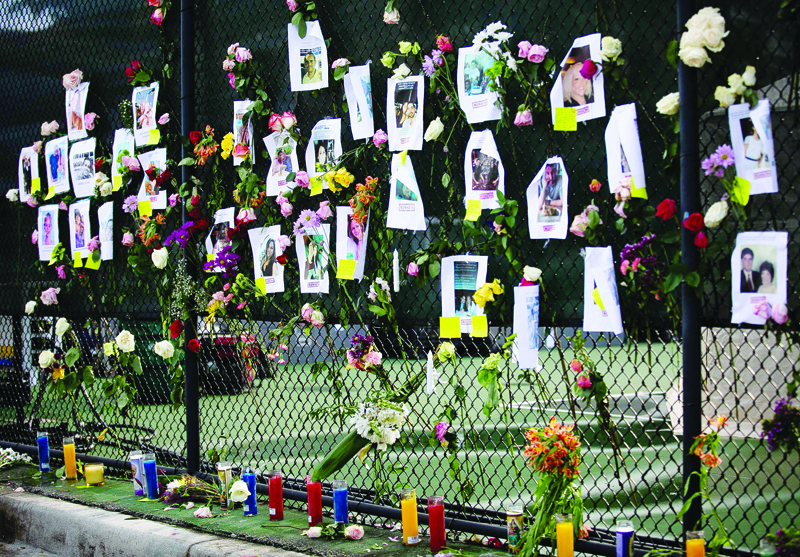MIAMI, US: Four people were confirmed dead and 159 unaccounted for Friday following the collapse of an oceanfront apartment building near Miami Beach, as rescue teams scoured a mountain of rubble in a desperate search for survivors. As shock set in among the local community in Surfside, the state's governor called for full light to be shed without delay on the causes of the freak disaster-which reduced one wing of a 12-story tower to a gigantic pile of debris.
Miami-Dade County mayor Daniella Levine Cava said late Friday authorities were still without news of 159 people who may have been asleep in Champlain Tower South at the time of the collapse, fueling fears of a much higher death toll. "We have not found anybody else in today's search," she told a news conference. "But through the night we will continue, and God willing, there will be some good news later tonight or in the morning." Rescue teams with sniffer dogs were searching the site-with recovered bodies put into yellow bags and transported away as homicide detectives worked to confirm the identities of the victims.
But faced with the painstakingly slow search operation, some began to voice their frustration. "Not enough is being done," said Mike Salberg, who came from New York after the accident. Five of his family members, including his parents, are unaccounted for. "I want answers," he told AFP. "The families are sidelined. We're being told that they have the best crews but they don't have the ability and the capacity... 40 hours later, four dead."
'We have hope'
President Joe Biden-who has ordered federal assistance for the relief effort-sent a message of support to the families, calling it a "tough, tough time." "There are so many people waiting. Are they alive? What will happen? So our heart goes out to them," he said at the White House. Biden spoke earlier Friday with Governor Ron DeSantis, who said the families deserved "a definitive explanation for how this could have happened."
DeSantis said it was important to "do this right, but also to do it timely-so that we get the answers to the families and that we get the answers to the people of Florida." The Surfside building was occupied by a mix of full-time and seasonal residents and renters, and officials have stressed it is unclear how many people were actually inside at the time of the collapse, which pancaked around 55 apartments.
Relatives of the missing have been gathering at a local community center, while occupants lucky enough to have been away when disaster struck are contemplating sudden homelessness. Canada said Friday at least four of its citizens may be "affected" by the collapse, without elaborating. At least 18 Latin American nationals are known to be among the missing-including Uruguayans, Argentines and Paraguayans.
Miami-Dade Fire Rescue assistant chief Ray Jadallah said search teams were being guided by sound. "It's not specifically, you know, human sounds-it could be, you know, tapping, it could be steel, you know, kind of twisting, it could be some of the debris kind of raining down," he explained to reporters. "We have hope. And every time that we hear sound, we concentrate in that area."
Questions over building
While the reasons for the collapse remain unclear, the condition of the 40-year-old waterfront building is certain to face scrutiny. Completed in 1981, Champlain Towers was due to be recertified this year in line with Miami-Dade county safety regulations, and was undergoing construction work on its roof as part of that process.
According to a study led by Florida International University environment professor Shimon Wdowinski, based on space-based radar data, the site showed signs of land subsidence in the mid-1990s. "I don't know if the collapse was predictable. But we did detect that the building moved in the 1990s," Wdowinski told CNN Friday, describing what was happening as a "slow process" of settling, rather than sinking.
Another of the university's experts, Atorod Azizinamini, chair of its department of civil and environmental engineering, said in an online video that it was too soon to speculate on a cause. He said structural engineers would collect vast quantities of data on design plans and construction methods, take samples of steel and concrete, look at signs of corrosion, examine the foundation, and try to detect any unusual event before the collapse.
"Once we have all the information we can simulate exactly different scenarios, and we can pinpoint how the collapse took place," Azizinamini said. "Unfortunately that is not going to be happening in a matter of days, weeks." "It's going to take some time." - AFP



